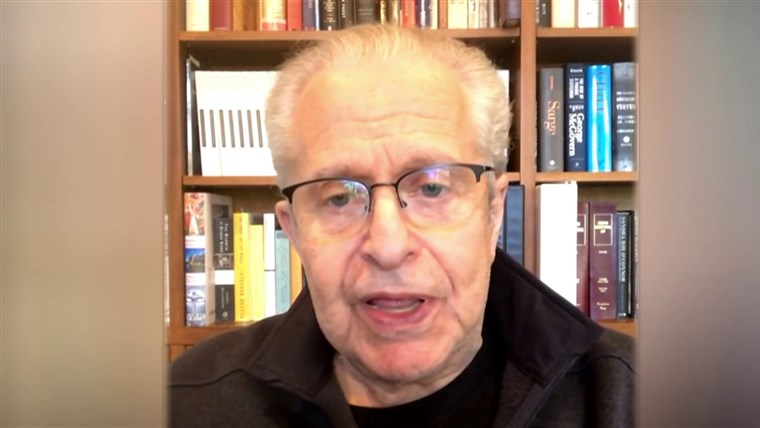President Trump has attacked the judiciary like few U.S. leaders before him, disparaging judges and their rulings as “dangerous,” “horrible” and “a complete and total disgrace.” Some of his supporters and fellow Republicans applaud and parrot him, but U.S. District Judge Carlton Reeves said he hears something sinister: echoes of a time when the Ku Klux Klan and the architects of the Jim Crow South attacked the courts for chipping away at segregation and racism.
In a speech to the University of Virginia School of Law on Thursday, Reeves criticized Trump’s aggressive responses to his administration’s losses in court and the lack of diversity in his judicial appointments — an extremely rare rebuke from a sitting federal judge. Though Reeves, whose court is in Jackson, Miss., never mentioned Trump by name, he quoted the president more than a dozen times and compared him to a stridently racist Alabama governor.
“When the executive branch calls our courts and their work ‘stupid,’ ‘horrible,’ ‘ridiculous,’ ‘incompetent,’ ‘a laughingstock,’” Reeves said, drawing from Trump’s Twitter feed, “you can hear the slurs and threats of executives like George Wallace, echoing into the present.”
Take Trump’s insults of Judge Gonzalo Curiel, Reeves said. Trump said Curiel should not hear a lawsuit against Trump University because Trump’s hard-line immigration polices presented a conflict of interest for Curiel, who is of Mexican descent.
“I know what I heard when a federal judge was called ‘very biased and unfair’ because he is ‘of Mexican heritage.’ When that judge’s ethnicity was said to prevent his issuing ‘fair rulings,’ when that judge was called a ‘hater’ simply because he is Latino,” Reeves said, “I heard those words and I did not know if it was 1967 or 2017.”
The White House declined to comment on the speech, which was first reported by BuzzFeed News. Reeves, through his law clerk, said he wouldn’t make any further comments.
[The real reason the Trump administration is constantly losing in court]
A transcript of Reeves’s remarks, obtained by The Washington Post, reads like a history lecture, complete with 130 footnotes and meditations on the racist past of American jurisprudence.
There have been three great assaults on the judiciary, Reeves argued. The first came after black plaintiffs, juries, lawyers and judges entered Mississippi courtrooms during Reconstruction. In that state, and across the South, he said, the Klan responded with violence, shooting black jurors and threatening to assassinate black judges. Congress packed courts with judges who were ex-Confederates and who had promised to fight for slavery, Reeves said.
“If you want to know what that kind of all-white justice looks like, what it feels like, what it hurts like,” he said, “ask the people in Mississippi who lived through it.”

U.S. District Judge Carlton Reeves addresses the University of Virginia School of Law, giving a speech that amounted to a rare public rebuke of the Trump administration from a sitting federal judge. (Sanjay Suchak/University of Virginia Communications)
The second offensive came midway through the 20th century, Reeves said, and included the Southern Manifesto, a screed opposing the Supreme Court’s decision in Brown v. Board of Education, the ruling against racial segregation in schools. More than 100 congressmen signed the document.
“Its signatories pushed to strip federal courts of jurisdiction over civil rights claims and impeach judges receptive to those claims,” Reeves said.
It was during this period, he said, that “white power returned to the playbook of the past: smearing judges, shrinking judicial power and scrubbing diversity from courtrooms.”
Half a century later, Reeves said, Americans are “eyewitnesses to the third great assault on our judiciary.”
“When politicians attack courts as ‘dangerous,’ ‘political,’ and guilty of ‘egregious overreach,’ you can hear the Klan’s lawyers, assailing officers of the court across the South,” he said.
It’s not that courts should be exempt from criticism, Reeves said. He maintained that debating judicial decisions ultimately improves the courts.
“But the slander and falsehoods thrown at courts today are not those of a critic seeking to improve the judiciary’s search for truth,” he said. “They are words of an attacker, seeking to distort and twist that search toward falsehood.”
Trump’s broadsides may be loud, but it’s his appointments that may end up having the most lasting effect, Reeves said. As of April 1, more than three-quarters of confirmed appellate and district court nominees were white, according to Alliance for Justice, a left-leaning advocacy group. More than 90 percent were male.
“That’s not what America looks like,” Reeves said. “That’s not even what the legal profession looks like. . . . There is no excuse for this exclusion of minority experiences from our courts.”
[Trump’s personal, racially tinged attacks on federal judge alarm legal experts]
Judges, especially at the federal level, typically try to eschew partisan tangles, particularly with presidents.
When Trump was a candidate, Supreme Court Justice Ruth Bader Ginsburg told the New York Times that she “can’t imagine what this place would be . . . with Donald Trump as our president.”
“For the country, it could be four years,” she said. “For the court, it could be — I don’t even want to contemplate that.”
Days later, Ginsburg apologized, calling her comments “ill-advised.”
Reeves, however, has drawn national attention before. In 2018, he issued a strongly worded decision striking down Mississippi’s law banning abortions after 15 weeks of pregnancy, chastising the state for choosing to “pass a law it knew was unconstitutional.”
In 2015, Reeves gave another stirring speech, that time a 2,500-word address from the bench, aimed at three white men who were sentenced in the killing of a black man — a hate crime, he said, that in the past would have been written off as “acceptable racially inspired pranks.” Instead he handed down sentences between seven and 50 years.
Reeves gave his speech Thursday as he accepted the university’s Thomas Jefferson Foundation Medal in Law, one of its highest awards. He began by addressing the third U.S. president’s complicated history — a mix of “genius,” “curiosity” and “industry,” along with well-documented racism.
“I must stand up and speak about that pairing,” he said. “How corrosive it has been since the days of Jefferson, who we all agree, was a man of his time. How often that pairing has been embraced throughout our history, by men of their times. And why we must defend against its poison when spewed today, by men of our time.”
Read more:
Company led by Trump nominee was rife with harassment, including groping and kissing, report says
President Trump targets Rep. Ilhan Omar with a video of twin towers burning
Antiabortion ‘heartbeat’ bills are illegal. Why do Republicans keep passing them?


